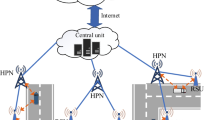
Overview
- Integrates behavior prediction with AI-driven resource management as a transformative framework for optimizing VSNs
- Provides detail on harnessing behavior prediction to create efficient, safe, and intelligent vehicular social networks
- Delves into the design and implementation of intelligent resource management systems for VSNs
Part of the book series: Wireless Networks (WN)
Access this book
Tax calculation will be finalised at checkout
Other ways to access
About this book
This book explores integrating behavior prediction with artificial intelligence-driven resource management to provide a transformative framework for optimizing vehicular social networks (VSNs). The book starts by providing an overview of the key issues encountered in VSNs, including the dynamic and unpredictable nature of vehicular mobility, varying communication demands, and the need for efficient resource allocation. A significant portion of the book is dedicated to exploring behavior prediction models for vehicles in VSNs. By analyzing the past movements, interactions, and social behaviors of vehicles, this book presents various prediction algorithms to anticipate future positions, communication patterns, and resource requirements. With behavior prediction as a foundation, the book delves into the design and implementation of intelligent resource management systems for VSNs. It demonstrates how predictive capabilities empower these systems to allocate communication, computing and caching resources dynamically. The book extensively evaluates the proposed intelligent resource management approach through extensive simulations and practical experiments. The results showcase the effectiveness of the system, highlighting significant improvements in network performance compared to traditional resource allocation methods. These findings validate the potential of behavior prediction and intelligent resource management in revolutionizing VSNs. Finally, this book provides conclusions and promising directions, hoping to stimulate future research outcomes in the field of vehicular networks from different perspectives. The book serves as an invaluable resource for researchers, engineers, and industry professionals interested in advancing the field of vehicular networks and harnessing behavior prediction to create efficient, safe, and intelligent VSNs.
Similar content being viewed by others
Table of contents (7 chapters)
-
Front Matter
-
Back Matter
Authors and Affiliations
About the authors
Haixia Zhang (Senior Member, IEEE) received the B.E. degree from the Department of Communication and Information Engineering, Guilin University of Electronic Technology, Guilin, China, in 2001, and the M.Eng. and Ph.D. degrees in communication and information systems from the School of Information Science and Engineering, Shandong University, Jinan, China, in 2004 and 2008, respectively. From 2006 to 2008, she was with the Institute for Circuit and Signal Processing, Munich University of Technology, Munich, Germany, as an Academic Assistant. From 2016 to 2017, she was a Visiting Professor with the University of Florida, Gainesville, FL, USA. She is currently a Full Professor with Shandong University, Jinan, China. Dr. Zhang is actively participating in many professional services. She is an editor of the IEEE Transactions on Wireless Communications, IEEE Wireless Communication Letters, and China Communications and serves/served as Symposium Chairs, TPC Members, Session Chairs, and Keynote Speakers of many conferences. Her research interests include wireless communication and networks, vehicular networks, industrial Internet of Things, wireless resource management, and mobile edge computing.
Dongyang Li received the B.E. and M.Eng. degrees in communication engineering from the School of Information Technology, Wuhan University of Technology, Wuhan, China, in 2015 and 2017, respectively, and the Ph.D. degree in information and communication engineering from the School of Information Science and Engineering, Shandong University, Jinan, China, in 2023. He is currently a Lecturer with the College of Oceanography and Space Informatics, China University of Petroleum (East China), Qingdao, China. His research interests include mobile edge computing, wireless edge caching, federated learning, and smart communication technologies.
Tong Xue received the B.E. degree from Electronic Engineering College, Heilongjiang University, Harbin, China, in 2017, the M.Eng. degree from the School of Electronics and Information Engineering, Harbin Institute of Technology, Harbin, China, in 2019, and the Ph.D. degree from the School of Control Science and Engineering, Shandong University, Jinan, China. She is currently a Lecturer with the College of Electronic and Information Engineering, Shandong University of Science and Technology, Qingdao, China. Her research interests include radio resource management, mobile edge computing, and vehicle-to-everything communications.
Accessibility Information
PDF accessibility summary
EPUB accessibility summary
Bibliographic Information
Book Title: Intelligent Resources Management for Vehicular Social Networks
Book Subtitle: Societal Perspectives and Current Issues in the Digital Era
Authors: Haixia Zhang, Dongyang Li, Tong Xue
Series Title: Wireless Networks
DOI: https://doi.org/10.1007/978-3-031-80169-3
Publisher: Springer Cham
eBook Packages: Engineering, Engineering (R0)
Copyright Information: The Editor(s) (if applicable) and The Author(s), under exclusive license to Springer Nature Switzerland AG 2025
Hardcover ISBN: 978-3-031-80168-6Published: 28 January 2025
Softcover ISBN: 978-3-031-80171-6Due: 11 February 2026
eBook ISBN: 978-3-031-80169-3Published: 27 January 2025
Series ISSN: 2366-1186
Series E-ISSN: 2366-1445
Edition Number: 1
Number of Pages: XII, 134
Number of Illustrations: 1 b/w illustrations, 40 illustrations in colour
Topics: Communications Engineering, Networks, Transportation Technology and Traffic Engineering, Mechanical Engineering



